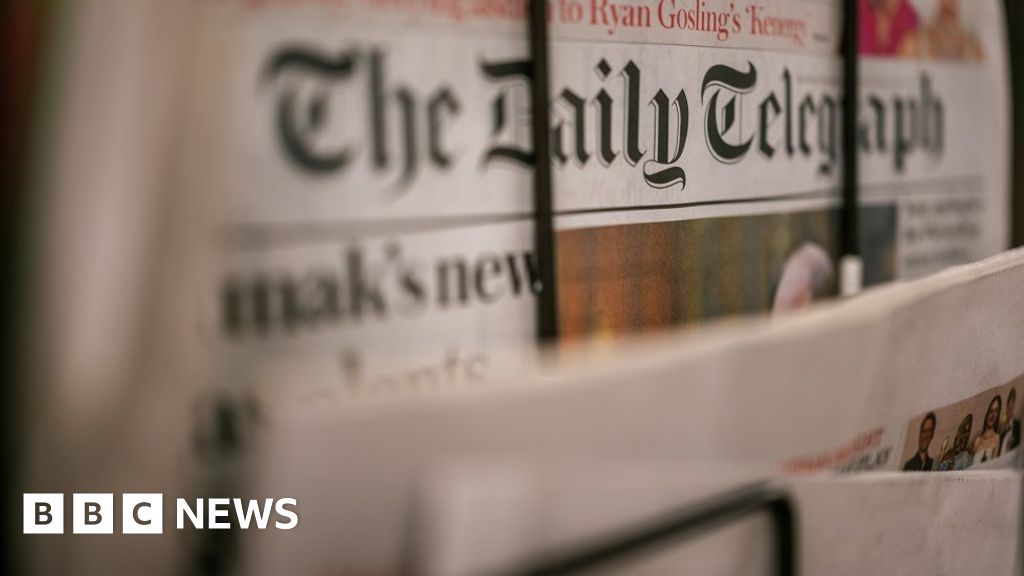
- Written by Brian Wheeler
- Political reporter
Image source, Getty Images
The British government has said that foreign governments will be banned from owning British newspapers and news magazines.
This follows criticism of the proposed takeover of the Daily Telegraph and Spectator newspapers by UAE-backed RedBird IMI.
The government said the proposed legislation would “provide additional protection for the free press.”
A spokesman for the UAE-funded group said they were “extremely disappointed by today's development.”
The Labor Party has indicated that it will support this change, which will be an amendment to a new law that will be discussed next week.
There was growing cross-party pressure on the government to act and it was facing possible defeat in the House of Lords on Wednesday from peers who wanted to see urgent action.
Announcing the ban, Lord Parkinson of Whitley Bay said the new law would “exclude mergers of newspapers and periodical news magazines that involve the ownership, influence or control of foreign states”.
He added that the government will put forward an amendment to the draft Digital Markets, Competition and Consumer Law – which will be read for the third time next week – to prevent such deals.
Lord Parkinson also confirmed that the takeover ban would not apply to broadcasters.
This comes as the investment fund RedBird IMI continues its efforts to control the titles of the Daily and Sunday Telegraph newspapers and the Spectator Current Affairs magazine, after paying off the debts of its former owner.
The fund is 75% owned by Sheikh Mansour, Deputy Prime Minister and Vice President of the United Arab Emirates, known in the United Kingdom for transforming Manchester City Football Club.
Lord Parkinson suggested that the government's new law could apply to the takeover of the Telegraph Media Group if the law is passed quickly.
But sources close to the matter told BBC business editor Simon Jack that the bid was likely to fail, amid growing political opposition.
Wednesday's announcement raises serious questions about whether the RedBird IMI acquisition could be revived.
In a statement in response to the move, a company spokesperson said they “remain committed” to investing in global media, adding: “We will now evaluate our next steps, with commercial interests continuing to be the sole priority.”
They continued: “To date, Redbird IMI has made six investments across the UK and US, and we believe the UK media environment deserves further investment.
“As with each of our deals, we were clear that the acquisition of The Telegraph and The Spectator was an entirely commercial venture.”
Other bidders for the newspapers include hedge fund tycoon Sir Paul Marshall, who owns GB News, the owners of the Daily Mail DMGT and Rupert Murdoch's News UK.
Andrew Neil – the Spectator's chairman who has strongly criticized the proposed takeover – said the government's intervention on Wednesday meant the UAE bid “now appears dead in the water”.
Lord Moore of Etchingham, a former editor of the Daily Telegraph, said there should have been “such a rule from the start” in order to provide “clarity” about the proposed takeovers.
Baroness Stowell, chair of the Communications and Digital Committee and a former Conservative government minister, has led cross-party calls to prevent foreign powers taking over UK news media organisations.
She told peers: “We cannot ignore that public trust in the news, Parliament and the political class has declined dramatically in recent years.
“Allowing foreign governments to own such an important and sensitive part of our nation would further damage public confidence in all of us if allowed to do so.”
Both the Government and Labor felt that the Conservative counterpart's alternative amendment to the Digital Markets, Competition and Consumer Bill was unworkable.
Lord Parkinson said the government instead hoped to make the change at a later stage of the bill.
Explaining how this would work, he said the government would refer proposed media mergers to the Competition and Markets Authority where there were “reasonable grounds” to believe the deal “would give a foreign state or body linked to a foreign state ownership, influence or control”.
He continued: “The Competition and Markets Authority will be obliged to investigate the potential merger, and if it concludes that the merger has or will result in a foreign state’s ownership, influence or control of a newspaper organisation, the Secretary of State will be required by statute to issue an order prohibiting or canceling the merger.”

“Travel specialist. Typical social media scholar. Friend of animals everywhere. Freelance zombie ninja. Twitter buff.”





More Stories
Taiwan is preparing to face strong Typhoon Kung-ri
Israel orders residents of Baalbek, eastern Lebanon, to evacuate
Zelensky: North Korean forces are pushing the war with Russia “beyond the borders”